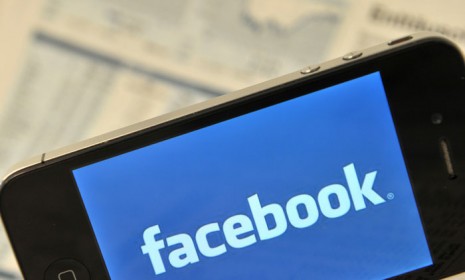Facebook's dismal earnings report: Proof that its bubble has popped?
The social network's slowing growth disappoints investors, and its stock price slides to an all-time low. Is the party over?

A free daily email with the biggest news stories of the day – and the best features from TheWeek.com
You are now subscribed
Your newsletter sign-up was successful
On Thursday, Facebook published its first earnings report since becoming a publicly traded company in May, and things got ugly very quickly. The social network's stock tanked in after-hours trading, losing 12 points, and its slide continued unabated on Friday, falling below $23 to an all-time low. The company reported a quarterly loss of $157 million, and even when adjusted for IPO-related costs, Facebook's profit was a mediocre $240 million. (By way of comparison, Apple just reported a quarterly profit of $9 billion.) Investors were particularly concerned about Facebook's revenue, which was up 32 percent from the previous year, but down from the larger year-over-year gains the company had reported in previous quarters. Furthermore, on the earnings call, Facebook was unable to satisfactorily articulate a strategy for earning advertising dollars from mobile devices, which are quickly becoming the main internet platform by which people interact with one another. Has the Facebook bubble burst?
Yes. And the fallout will spread throughout the tech world: The hype for Facebook has collapsed, a sign "that the second internet bubble is over," says Nathan Vardi at Forbes. The internet economy has changed drastically since Facebook first made its mark — most notably with smartphones — and that's why "many of the hottest tech companies touting social networking attributes" have been "stock market disasters." The "steep and rapid decline of the stocks" of Facebook and other tech companies — such as Zynga and Groupon — are reminiscent of the great internet bubble crash of the late 1990s.
"With Facebook earnings, the second internet bubble is over"
The Week
Escape your echo chamber. Get the facts behind the news, plus analysis from multiple perspectives.

Sign up for The Week's Free Newsletters
From our morning news briefing to a weekly Good News Newsletter, get the best of The Week delivered directly to your inbox.
From our morning news briefing to a weekly Good News Newsletter, get the best of The Week delivered directly to your inbox.
No. Facebook is wisely taking its time: Investors are disappointed that Facebook's "ad business is developing slowly," but that's actually "good news," says Rolfe Winkler at The Wall Street Journal. "Facebook's most compelling sales opportunity, putting ads directly in users' desktop and mobile news feed, remains in its infancy." But Facebook is smart to go slow: It has to "condition users" to receiving more ads "without driving them away."
"Facebook's slow dance with markets"
And Facebook has other potential revenue sources: Outside of mobile, "Facebook is widely thought to have other channels to make money," says Somini Sengupta at The New York Times. "Its crown jewel is what its users share about themselves, including who they are, where they went to school, pictures of their children, political predilections, and what they read and listen to" — all of which is gold for advertisers. "Facebook has been aggressively experimenting with how to exploit all this data," such as connecting user's "likes" to specific brands, and the results could be promising.
"Facebook shares plummet in an earnings letdown"
A free daily email with the biggest news stories of the day – and the best features from TheWeek.com